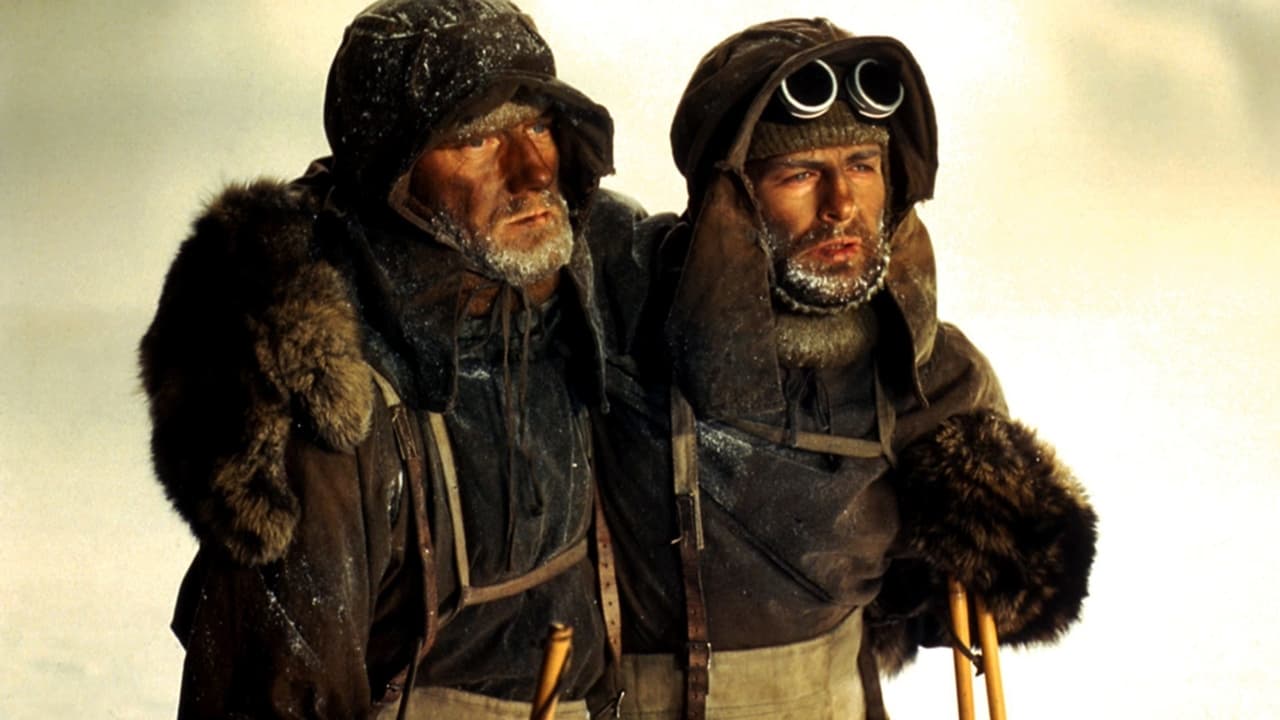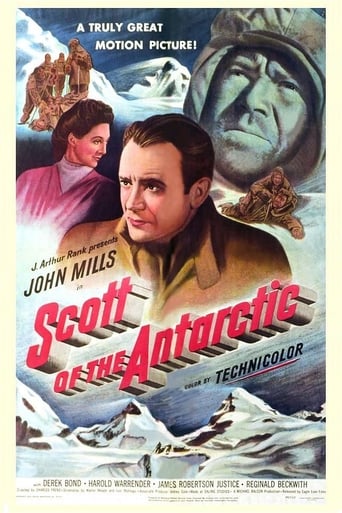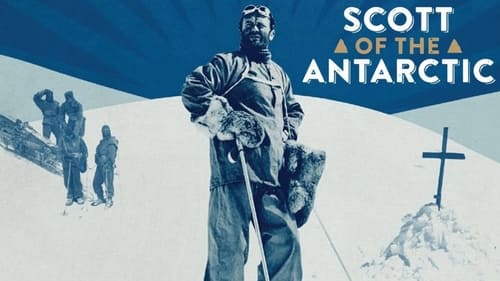


This is a straightforward, competent telling of the story of Scott's ill-fated 1910-1912 expedition to be the first to reach the South Pole. We know what happened to the final five because they kept detailed diaries, which were recovered after their deaths.The movie feels almost like a documentary, but one whose goal is to overtly emphasise the heroic virtues of the men involved. Once the movie gets to the scenes showing Scott's party in extremis, it becomes a gripping story of tough men -- without sufficient supplies -- dealing with unexpectedly brutal weather and an unimaginable physical effort.It all seems so incredible now: walking and skiing with dogs, ponies and supply-laden toboggans for hundreds of kilometres in the freezing cold. And to do it for the glory of the British Empire? Amundsen was the first to reach the South Pole, but how many of us know that factoid or even remotely care?Yes, the cruel irony is that a Norwegian team commanded by Amundsen had already done the feat a month earlier, without loss of human life. I know some will disagree with me, but Scott's expedition turned out to be a pointless folly and a failure.I wouldn't call this movie timeless. If this had been a modern movie or documentary, we would have wanted to know more about why things went wrong for the Scott expedition. We would also would have wanted to know more about the tension between the party members. In this movie we just see stalwart men and stiff upper lips. We would have insisted on being shown the killing of the dogs and ponies. The movie was made in 1948, so the story presented here is heavy on the heroism and light on the actual details of what went wrong. Still, this 60-year-old movie was very well made and has a modern feel. It is still interesting to modern movie watchers. It's a good historical movie.In the beginning of the film, the scenes in Edwardian England show with some detail and accuracy what this long lost, romantic and idealistic world was like. The scene that sticks in my mind is that of the crowd of well wishers at the dock as the Terra Nova sails off. Such a different world, yet only a century ago. The anguish on Scott's wife's face was moving.
... View MoreThis is the story of English explorer Robert Scott's 1912 expedition to the South Pole, perfectly portrayed by British actors, who are without a doubt, the finest actors in the world.John Mills is excellent as Captain Scott in a faithful performance which mirrors Scott's unassuming nature and sincere kindness. A fine supporting cast includes Reginald Beckwith as fellow explorer Bowers and Diana Churchill as Captain Scott's wife, Kathleen.The real-life final letters written by the party at the end of their mission are respectfully and touchingly presented capturing not only the tragedy of the moment, but also the bravery, honor, and adventuresome spirit of these great men.Majestically photographed in color in 1948. A truly beautiful film.
... View MoreI saw this years ago and only recently caught the final bleak half hour, but it was just as impressive the second time around. Half a dozen men intrigue and importune to get together the first expedition to find the South Pole. It's an excellent cast and the photography is impeccable. So are the make up and the visual effect. That makes it all the more sad that they discover the South Pole but don't make it back.It's a heartbreaking film but a thought-provoking story as well. What is it that drives men to undertake such risky tasks when they have no practical purpose? Facile answers like "heroism" or "pride" won't do.Sebastian Junger, who has a degree in anthropology, has explored the topic and described the kind of men who are drawn toward dangerous work, such as "tree toppers" in the lumber industry. My anthropology professor, John M. Roberts, developed the hypothesis that an adrenalin rush was involved, that certain people can become internal adrenalin addicts. They come to NEED that rush.But any explanation can be only partial, however plausible it might sound. If Roberts were still alive, I'd ask him to look into blood testosterone levels, or I'd do it for him.There are social factors at work as well. Would Scott and his colleagues have taken on a suicidal journey if no one could ever have found out about it? If they didn't represent England, but only themselves? Would America have developed its space facilities and put the first men on the moon if no one would ever know about it? In any case, some second-unit footage was shot in Antarctica but most of the location shooting was done in the Alps and in Norway. It's not as overwhelming as the desert in "Lawrence of Arabia," but given the technology and commercial arrangements of the time, it's very convincing, and so are the studio scenes. Antarctica is a majestic continent. There's really nothing much there. And there are times when I wish we'd leave it alone in its pristine form, free of humans and their artifacts and their garbage. Sometimes I feel the same way about the Titanic, a vast rusting graveyard. Hasn't it been through enough without being exploited for a few more pennies? Sorry, I almost fell off that editorial soap box again, but that doesn't affect the many virtues of this film. Despite the climactic melancholy, you won't regret watching it.
... View MoreThis film stars John Mills and is about the Scott expedition to the South Pole shortly before WWI. It shows the preparations and actual expedition--mostly shot in Norway, as going to Antarctica would have been prohibitively expensive and difficult.Although "Scott of the Antarctic" is a very well made film (after all, it's from Ealing Studios!), it suffers from two major problems. First, for the viewer to really get into the film and enjoy it, you need to buy into the notion that going to the South Pole is actually worth doing and is not a complete waste of time and lives. I hate to be a downer, but I clearly fall into that category and feel that people who attempted things like this were brave but also rather foolish--especially since the film shows many mistakes Scott made in planning the expedition. Sorry but I am sure I am not the only one who feels this way. Second, anyone who knows history knows of the fate of Scott and his expedition--and so the film is extremely anticlimactic and you know it's just a matter of time until they all become human popsicles. For me, it was just a waiting game. Plus, their competition had already made it to the Pole before Scott-- making the entire expedition a waste of time and human lives.If you can ignore all this, then yes, it is a very good film. Unusual for its time, the movie was shot in color and extensively followed the actual logs of events. The acting is lovely, as is the music and direction. All in all, it's full of all the glory and pomp you'd want in a movie that appears to glorify the British Empire and the 'can do' spirit. But, when you think about it, it's a great example of the 'can't do' spirit--and is, perhaps, a bit of a metaphor for the British Empire circa 1948.
... View More